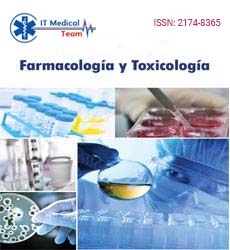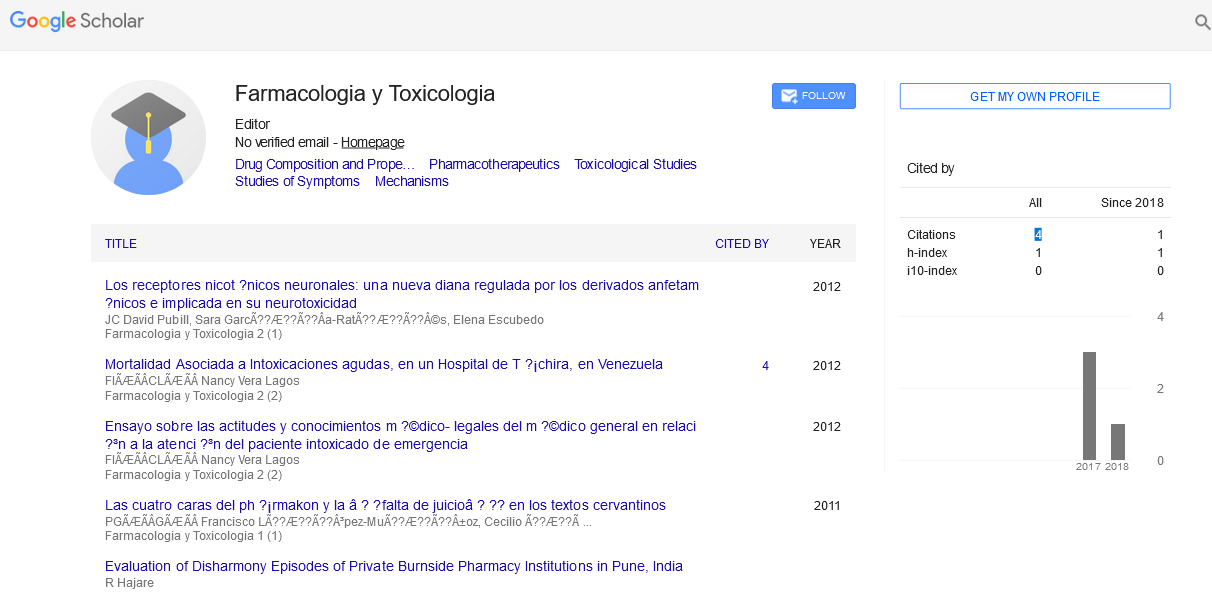Perspective - (2023) Volume 13, Issue 6
Toxicological studies: A comprehensive overview
Karthik Nagapudi*
Department of Toxicology, University of Hichigan, Ann Arbor, United States
*Correspondence:
Karthik Nagapudi, Department of Toxicology, University of Hichigan, Ann Arbor,
United States,
Email:
Received: 30-Oct-2023, Manuscript No. ipft-23-14169;
Editor assigned: 02-Nov-2023, Pre QC No. P-14169;
Reviewed: 16-Nov-2023, QC No. Q-14169;
Revised: 05-Dec-2023, Manuscript No. R-14169;
Published:
14-Dec-2023, DOI: -
Introduction
Toxicological studies are a vital branch of science that aims to
understand the adverse effects of various substances on living
organisms and ecosystems. This field is essential for assessing
and mitigating risks associated with exposure to potentially
harmful agents, such as chemicals, drugs, pollutants and
biological toxins. In this comprehensive overview, we will
explore the fundamental concepts of toxicology, its history,
methods and its critical role in modern society, including the
evaluation of environmental contaminants, drug safety and
the protection of public health. Toxicological studies play a
pivotal role in the development and approval of
pharmaceutical drugs. These studies are designed to assess
the safety and efficacy of drugs, ensuring that they are both
effective in treating the targeted condition and safe for
human consumption. The field of toxicology encompasses
various facets, including pharmacokinetics,
pharmacodynamics and the assessment of potential adverse
effects. This article delves into the significance of
toxicological studies in drug development, their
methodologies and how they contribute to the overall wellbeing
of patients and the pharmaceutical industry.
Description
Historical perspective
The roots of toxicology can be traced back to ancient
civilizations, where observations of the harmful effects of
certain substances on humans and animals began. However,
toxicology as a formal discipline emerged in the 16th century
when Paracelsus, a Swiss physician and alchemist, coined the
famous phrase, "The dose makes the poison." Paracelsus
emphasized the importance of dose-response relationships,
which is a foundational principle in toxicology. Over the
centuries, toxicology has evolved, incorporating advances in
various scientific disciplines such as chemistry, biology and
medicine, to become the multidisciplinary field we know
today.
Key concepts in toxicology
Dose-response relationships: As Paracelsus asserted, the
dose of a substance plays a critical role in its toxicity.
Toxicologists study how the intensity and duration of
exposure to a toxic agent influence the response in living
organisms. Understanding dose-response relationships is
fundamental for setting safety standards and guidelines for exposure to chemicals and drugs.
Toxicity pathways: Toxicological studies aim to unravel
the mechanisms by which toxic substances exert their
harmful effects. This involves identifying the biochemical
and physiological pathways that are disrupted by the toxic
agent. Knowledge of these pathways is crucial for developing
treatments and interventions to mitigate toxicity.
Risk assessment: Toxicologists assess the potential
risks associated with exposure to toxic substances. This
process involves hazard identification, dose-response
assessment, exposure assessment and risk characterization.
Risk assessment is essential for regulatory agencies and
policymakers to establish safety standards and guidelines.
Methods in toxicological studies
Toxicological studies employ a wide range of methods
to investigate the effects of toxic substances. Some
common approaches include:
In vitro studies: These studies involve using isolated cells
or tissues to assess the toxicity of substances. In vitro experiments are valuable for preliminary screening of
potential toxicants and for understanding cellular and
molecular mechanisms of toxicity.
In vivo studies: In vivo experiments are conducted
on living organisms, such as animals or humans. These
studies provide a more comprehensive view of toxicity,
including systemic effects, metabolism and interactions
with other substances in the body.
Epidemiological studies: Epidemiological research
investigates the health effects of toxic substances in human
populations. It helps to establish associations between
exposure to specific agents and adverse health outcomes.
Such studies are critical for understanding the long-term
effects of environmental pollutants and occupational
exposures.
Computational toxicology: This emerging field uses
computer models and simulations to predict the
toxicological properties of chemicals and their potential
risks. Computational toxicology is becoming increasingly
important for the rapid screening of large numbers of
chemicals.
Applications of toxicological studies
Toxicological studies have wide-ranging applications
that impact various aspects of modern society:
Environmental toxicology: Assessing the impact of
pollutants and contaminants on ecosystems is a primary
focus of environmental toxicology. This field helps identify and mitigate the ecological risks associated with industrial,
agricultural and household chemicals.
Drug safety evaluation: Before a new drug is approved for
human use, extensive toxicological studies are conducted
to assess its safety. These studies are essential for identifying
potential side effects, determining safe dosages and ensuring
that the benefits of the drug outweigh its risks.
Occupational health: Occupational toxicology focuses
on evaluating the health risks faced by workers who may
be exposed to hazardous substances in their workplaces.
Understanding these risks is crucial for implementing
safety measures and protecting workers' health.
Public health protection: Toxicological studies play a
key role in setting regulations and safety standards for
chemicals, food additives and environmental pollutants.
These regulations aim to safeguard public health by limiting
exposure to harmful substances.
Challenges in toxicology
Despite the progress made in toxicology, several challenges
persist:
Data gaps: There is often insufficient data on the toxicity of
many chemicals, particularly those that are newly developed
or used in small quantities. This makes it challenging to
assess their risks adequately.
Complex mixtures: Real-world exposure often involves
complex mixtures of chemicals, making it difficult to assess
the combined effects of these substances accurately.
Interindividual variation: People's responses to toxic
substances can vary widely due to genetic, environmental
and lifestyle factors. Understanding and accounting for this
variation is a significant challenge.
Emerging substances: The rapid development of new
chemicals, such as nanomaterials and synthetic drugs,
poses challenges in toxicological assessment, as traditional
testing methods may not be applicable.
Conclusion
Toxicological examinations are a basic logical discipline
that supports the security of synthetics, drugs and our
current circumstance. The set of experiences, techniques
and utilizations of toxicology mirror its significance
in safeguarding general wellbeing and the climate. As
society keeps on confronting new difficulties from
arising substances and complex combinations, the area of
toxicology should adjust and develop to satisfy the needs
of the advanced world, guaranteeing the security and
prosperity of people and biological systems.





